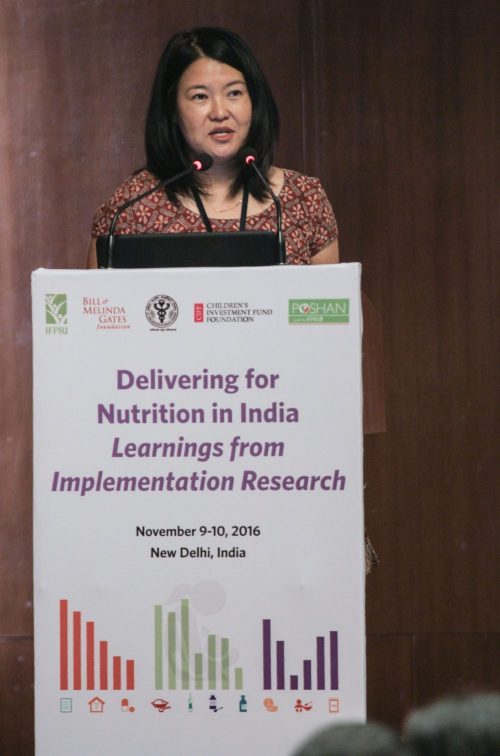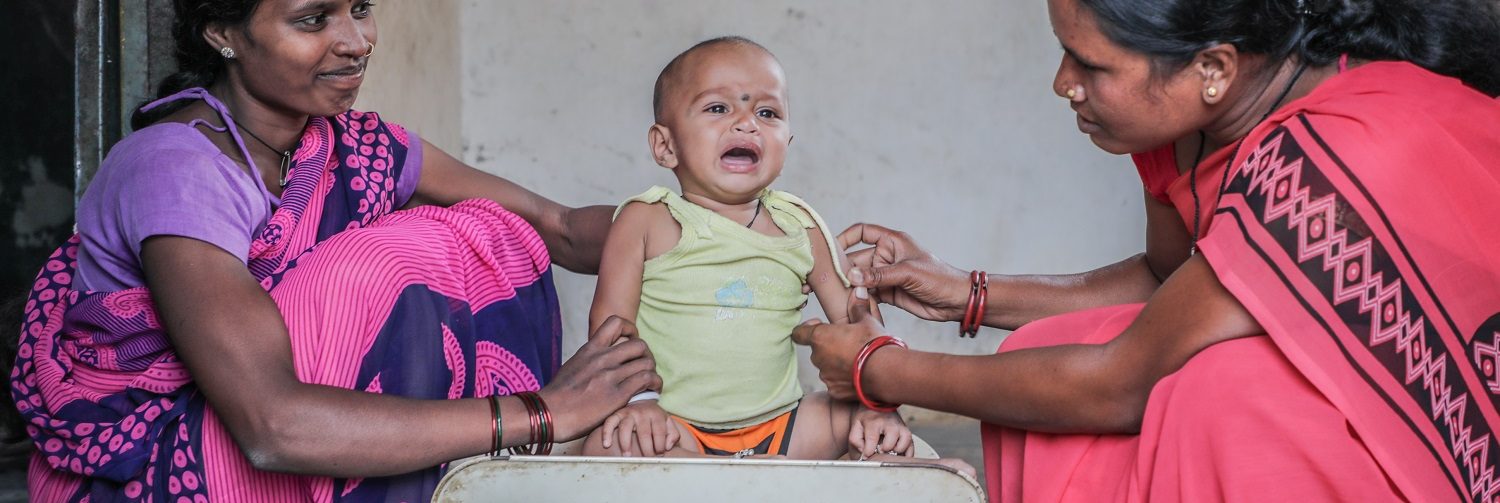 The seventh session of POSHAN’s implementation research conference took participants to the frontlines of service delivery, by presenting evidence on the drivers of health and nutrition service use and some innovative interventions (information and communication technology and performance-based incentives) used to improve service coverage and frontline workers’ performance. First, Dr. Sunny Kim, IFPRI, presented on the frontline worker and household determinants of exposure to three essential nutrition interventions (maternal iron and folic acid supplementation, support for early initiation of breastfeeding, and counseling for complementation feeding), based on an operational study carried out in Madhya Pradesh and Odisha. Marked differences were observed in the supply-side factors (such as workers’ education, caste, and workload) and demand-side factors (such as household socioeconomic status, caste, and health-seeking behaviors) influencing service use for different interventions and between states. Overall, mothers’ predisposing characteristics (age and education) played a lesser role in service use, while enabling factors such as having a maternity benefits card and participation in the village health and nutrition days were very important. Clarity in the workers’ roles in service provision was also observed as an important factor.
The seventh session of POSHAN’s implementation research conference took participants to the frontlines of service delivery, by presenting evidence on the drivers of health and nutrition service use and some innovative interventions (information and communication technology and performance-based incentives) used to improve service coverage and frontline workers’ performance. First, Dr. Sunny Kim, IFPRI, presented on the frontline worker and household determinants of exposure to three essential nutrition interventions (maternal iron and folic acid supplementation, support for early initiation of breastfeeding, and counseling for complementation feeding), based on an operational study carried out in Madhya Pradesh and Odisha. Marked differences were observed in the supply-side factors (such as workers’ education, caste, and workload) and demand-side factors (such as household socioeconomic status, caste, and health-seeking behaviors) influencing service use for different interventions and between states. Overall, mothers’ predisposing characteristics (age and education) played a lesser role in service use, while enabling factors such as having a maternity benefits card and participation in the village health and nutrition days were very important. Clarity in the workers’ roles in service provision was also observed as an important factor.
Dr. Anu Rangarajan, from Mathematica Policy Research, presented on findings from an evaluation of a mobile-phone application to improve the performance of frontline workers, as part of the Ananya program implemented by CARE to improve maternal and child health outcomes in Bihar. Several improvements were observed in performance – more frequent interactions with households, more antenatal care and delivery preparation, improved timing of complementary feeding, and improved reproductive health. However, challenges remained in using the various features of the tool, and the cost was USD 110 per worker with USD 75 per year in operating costs.
Similarly, Dr. Dhiren Modi, from SEWA-Rural, presented on the effectiveness of a mHealth intervention to improve coverage of maternal and newborn health interventions in Gujarat. A mobile phone application was used to help frontline workers to diagnose morbidities, track and follow-up high-risk cases, provide information to clients, etc. Although tool use required extensive training (4 weeks), several positive results were observed such as increased number of home visits, increased recognition of danger signs among newborns, increased satisfactory counseling, and improved early initiation of and exclusive breastfeeding.
As part of the Ananya program in Bihar, Dr. Sunil Babu, from CARE, presented results of an evaluation of team-based goals and performance-based incentives for frontline workers. The team-based goals were results-oriented and linked to individual performance, and the non-monetary incentives included certificate from government officials and work recognition at a district-wide event upon completion of 7 sub-center level targets. These results-oriented goals and teamwork among frontline workers had a positive impact on infant and young child feeding practices.
Lastly, Dr. Prakarsh Singh, from Amherst College, presented via video on the impact of performance-based incentives for anganwadi workers on child health. The trial compared performance-based bonus payments (<5% of salary) and a fixed bonus (of similar amount) to the control (salary only). Small bonuses improved child health outcomes (e.g. prevalence of underweight), but total gains and threshold effects were larger when bonuses were linked to outcomes/performance.
This session showed the importance of both supply-side and demand-side factors in service provision and that the use of information and community technology and non-monetary performance-based incentives can improve service coverage and outcomes related to maternal and child health.
Written by Sunny Kim, IFPRI
Related resources:
POSHAN Report: Delivering for Nutrition in Madhya Pradesh: Insights from a Study on the State of Essential Nutrition Interventions
POSHAN Report: Delivering for Nutrition in Odisha: Insights from a Study on the State of Essential Nutrition Interventions
POSHAN Implementation Note: The Health Subcenter as an Effective Platform for Coordinated Capacity Building and Supportive Supervision of Frontline Workers
POSHAN Implementation Note: Building the Capacity of Frontline Workers to Improve IYCF Practices among Marginalized Communities in Odisha


